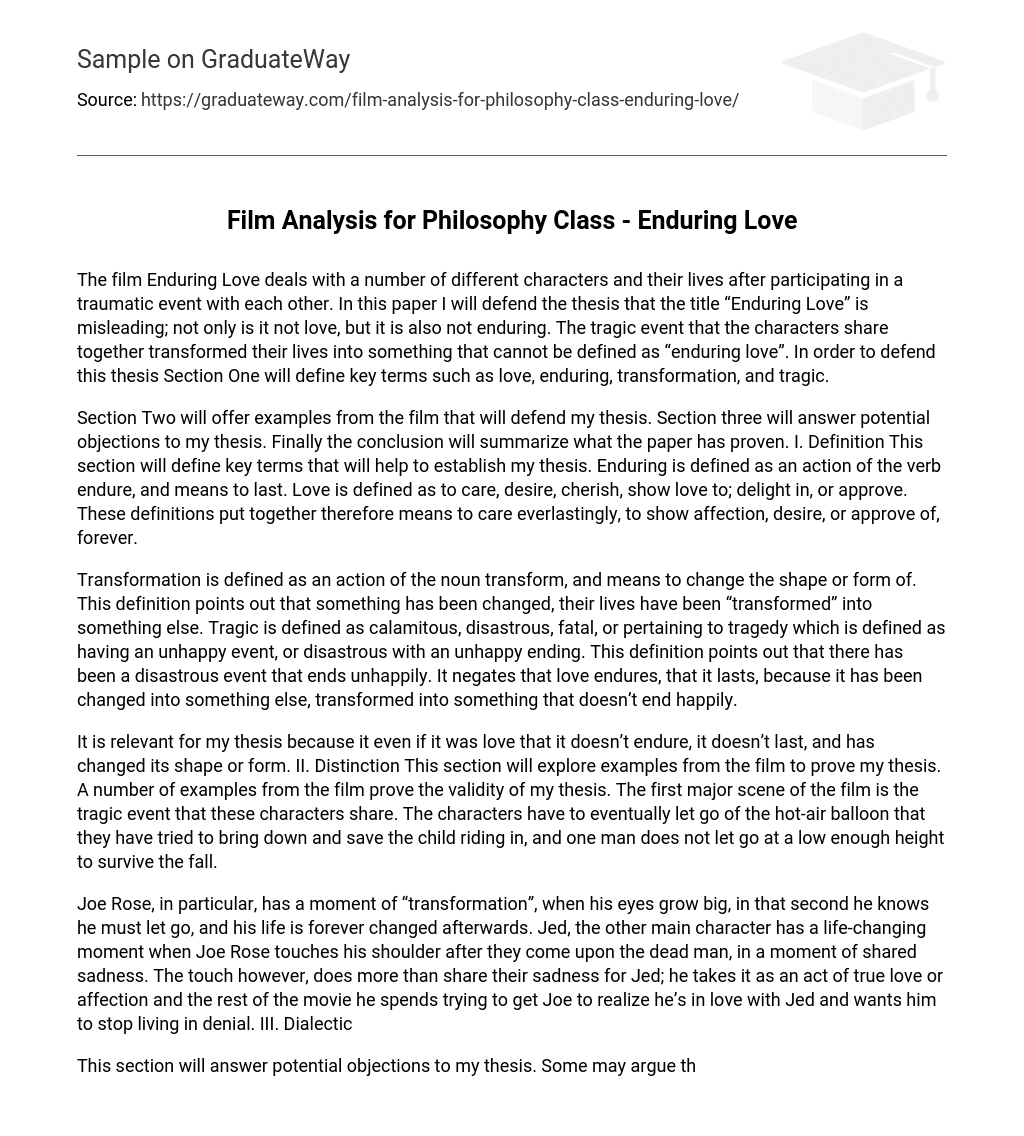The film Enduring Love deals with a number of different characters and their lives after participating in a traumatic event with each other. In this paper I will defend the thesis that the title “Enduring Love” is misleading; not only is it not love, but it is also not enduring. The tragic event that the characters share together transformed their lives into something that cannot be defined as “enduring love”. In order to defend this thesis Section One will define key terms such as love, enduring, transformation, and tragic.
Section Two will offer examples from the film that will defend my thesis. Section three will answer potential objections to my thesis. Finally the conclusion will summarize what the paper has proven. I. Definition This section will define key terms that will help to establish my thesis. Enduring is defined as an action of the verb endure, and means to last. Love is defined as to care, desire, cherish, show love to; delight in, or approve. These definitions put together therefore means to care everlastingly, to show affection, desire, or approve of, forever.
Transformation is defined as an action of the noun transform, and means to change the shape or form of. This definition points out that something has been changed, their lives have been “transformed” into something else. Tragic is defined as calamitous, disastrous, fatal, or pertaining to tragedy which is defined as having an unhappy event, or disastrous with an unhappy ending. This definition points out that there has been a disastrous event that ends unhappily. It negates that love endures, that it lasts, because it has been changed into something else, transformed into something that doesn’t end happily.
It is relevant for my thesis because it even if it was love that it doesn’t endure, it doesn’t last, and has changed its shape or form. II. Distinction This section will explore examples from the film to prove my thesis. A number of examples from the film prove the validity of my thesis. The first major scene of the film is the tragic event that these characters share. The characters have to eventually let go of the hot-air balloon that they have tried to bring down and save the child riding in, and one man does not let go at a low enough height to survive the fall.
Joe Rose, in particular, has a moment of “transformation”, when his eyes grow big, in that second he knows he must let go, and his life is forever changed afterwards. Jed, the other main character has a life-changing moment when Joe Rose touches his shoulder after they come upon the dead man, in a moment of shared sadness. The touch however, does more than share their sadness for Jed; he takes it as an act of true love or affection and the rest of the movie he spends trying to get Joe to realize he’s in love with Jed and wants him to stop living in denial. III. Dialectic
This section will answer potential objections to my thesis. Some may argue that the title of the film has to do with the main character Joe and his long-time girlfriend. There are many examples that support this claim. For example the scene where Joe explains to her that he had planned to propose the afternoon they tried to save the hot-air balloon, but changed his mind when the tragedy occurred might show that they are the ones the movie title refers to. The scenes that show Joe and girlfriend at home, in bed, in the bathroom, and at her work, all would indicate that they are the characters feeling “enduring love”.
Even though these examples seem convincing, they do not refute my thesis because it turns out that Jed is the one who thinks Joe is in love with him. Jed believes that Joe is sending him messages by leaving his curtains drawn a particular way, and therefore in love with him, but in denial. Jed’s life was transformed the moment Joe touched his shoulder and he takes it to heart, continues to phone him at all hours, follow him around, and then kiss him full on the mouth, before plunging the knife into Joe’s girlfriend. CONCLUSION The essay has defended the position that the title Enduring Love is incorrect, and that it is not love, nor enduring.
The definition of enduring love (meaning affection or desire for, everlastingly, or to last) does not refer to Joe and his long-time girlfriend, nor to Jed and Joe. The only thing that is enduring is the transformative moments that occur after they participate in the tragic event together in the beginning. The moments each of their lives are changed by this event are not filled with love, they are filled with deep sadness, and in Jed’s case, confusion and desperation. In his deluded mind, Joe is in love with him, has been sending him signals and is simply in denial.
He takes it as far as plunging a knife into Joe’s girlfriend, in an effort to get her out of the way. Though he may have been transformed by Joe’s simple affection in sharing their grief, (when he touched his shoulder) it is not by love, nor is it enduring. It ends with Jed smiling from a mental institution where he’ll probably spend the rest of his days. Joe and his girlfriend visit the scene of the accident where it appears as if they may get back together. If anything, what they may have in the future with each other, was dramatically different than what they started with, and that is what might endure.





